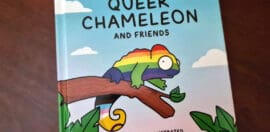Doco of the Month: 2040

11 June 2019 at 8:42 am
What will the world look like in 2040? Director Damon Gameau talks to Wendy Williams about his vision for his daughter’s future and why we all need to join the regeneration, as part of a series profiling powerful documentaries in partnership with Documentary Australia Foundation.
In motivating thousands of school children around the globe to take to the streets and demand action from governments on climate change, Greta Thunberg told the world: “I don’t want your hope… I want you to panic… I want you to act as if the house is on fire. Because it is.”
Award-winning director Damon Gameau thinks there’s room for a different story.
Set up as a visual letter to his four-year-old daughter, 2040 takes the audience on a journey to reveal what is possible in the fight against climate change.
Gameau, who gave the world That Sugar Film, describes making 2040 as an exercise in fact-based dreaming.
The premise: “In 2040 what would the world look like for our daughter if we just embraced the best that already exists.”
It highlights a number of opportunities currently being explored around the world from renewable energy microgrids in Bangladesh, to autonomous electric vehicles in Singapore, to marine permaculture in Tasmania and regenerative agriculture in Victoria.
It is a welcome tonic from the negative headlines and doomsday narrative that often surrounds talk of climate change.
For Gameau that is the point. We need hope as well as fear.
“You look at the work of Viktor Frankl or any psychologist really. They talk about how important hope is as a motivator and how the potential of a positive outcome is a great way to get people to move into action,” he says.
“I just wanted to throw into the mix this idea of let’s posit a different future and show what it would look like if we put these actions into play.”

He says we can’t be prescriptive about how we want people to respond.
Some people are going to want to get out on the streets and rally. Others may prefer to invest in hope and invest in a solution.
“We need all of the above,” Gameau says.
“I think for a lot of people right now, they don’t know what the alternative is. It’s scary.
“We saw that in the election, people are fearful of change, they can’t see that a better world is possible. So they double down, they retreat, they won’t instigate any change. And that’s the last thing we need right now.”
For Gameau, his motivation to make the film was born out of his own sense of hopelessness about climate change.
After spending three years researching and making the film, it was a seaweed project that brought it home that a more positive future was possible.
“If we were able to implement it on a large scale and really start growing these giant plants out at sea, it is just extraordinary how much carbon we would be able to sequester and then actually kickstart these ecosystems,” he says.
“That was the moment I thought ‘Wow, this could have a profound impact if we actually upscaled this quickly enough’.
“So there were lots of moments throughout the film, but that was the one where I actually called my wife back home and said ‘I think we can actually do this’.”

Gameau says he has changed his own behaviours since making the film.
The number one thing is being more diligent with food waste. He also now very rarely eats meat, and when he does he makes sure it is regeneratively farmed. He is more aware of his travel and has bought an electric bike.
But he says while all those small things are important – they can send cues to other people about what is an accepted form of behaviour – people need to get involved at a much higher level now.
“So that’s why we really encourage people to go in and ask their boss or their work colleagues what they can do at work, or what can your school do to help out. Can they put on solar or compost their food or get the food waste system going?” he says.
“What are those things you can do at a community level that involve other people to bring them in and connect and actually take action together. That’s the point we’re at now. And if we don’t do that we’re just not going to get there.”
More than a documentary, 2040 is about kick-starting the Regeneration, a global movement of people who are mobilised to learn about, contribute to, advocate for and invest in regenerative solutions that improve the wellbeing of the planet.
The What’s Your 2040 website, is a participatory action hub where audiences can explore their own personal climate action plans and connect with a network of organisations who are all doing their part to combat climate change.
“The film was always just the first tiny part of a much larger ecosystem,” Gameau explains.
The team have partnered with Carbon8, which supports farmers to transition to regenerative agriculture by helping them put carbon back into the soil. They are involved with a plan to build Australia’s first seaweed platform. And they have worked with Cool Australia to provide free lesson plans for primary and secondary teachers.
“And there’s just a range of other things that people are working on behind the scenes in different ways to get more people involved and get big corporations involved and get government involved,” he says.

An important step moving forward is to create a dashboard on the website to show how they are measuring their success.
“For the lesson plans with schools, we know how many schools we’re in so that’s a simple metric,”Gameau says.
“We’ve worked with a group in Germany called Ecosia and they are a search engine that allows you to plant trees. We can track how many trees our community has planted through switching to that browser and we can also have a rough estimate of the amount of carbon that has been sequestered.
“The same with the seaweed platform… and with Carbon8, the more farmers we can get involved there, we’re going to have a really clear measurement of how much carbon we’re putting back in the soil.”
He says to convince people who aren’t motivated by the issue to get on board, it is important to get the message right, and not beat people over the head with it.
“People shut down when they are being preached at or told what to do. You’ve got to offer it up in a very delicate way and be very careful with language,” he says.
Gameau believes what we saw in the recent federal election was likely a failure of communication around the benefits of some of the solutions.
The solutions can strengthen communities, provide security and create jobs.
“But I just don’t think that was articulated clearly enough,” he says
“I think people do care about the environment, they care about the planet, they care about their kids. But they have also got a lot on their plate and they’re trying to survive, so it’s very hard to think on a big picture scale if you are just trying to live day to day.
“I think we need to make sure we’re getting to those people with the right language and the right words to actually help them and transition them through, rather than trying to just drag them kicking and screaming.”
He says it is incumbent on all of us to take action.
We can’t just leave it to future generations.
“The kids are driving the change because they understand it and it is their future at stake. So I think we really need to nurture them coming through but then also not get complacent and just expect them to do it. I think that would be really dangerous,” he says.
“We’ve got past that point now. There is a matter of urgency to this whole situation. We’re going to need everyone’s assistance if we are to pull this off.”
Gameau he says he is hopeful for the future.
“I know now that it’s possible,” he says.
“I still have moments of feeling overwhelmed and wondering if we are going to get there – I think it’s important that we all acknowledge the reality of that – but what I do feel now is that it’s possible. I didn’t know that three years ago.”
For more information on 2040 or to join the regeneration see here.
Each month Pro Bono Australia and Documentary Australia Foundation present a Doco of the Month, profiling powerful documentaries with social impact at their heart.
Documentary Australia Foundation is Australia’s only not-for-profit organisation that fosters social change through documentary storytelling.








